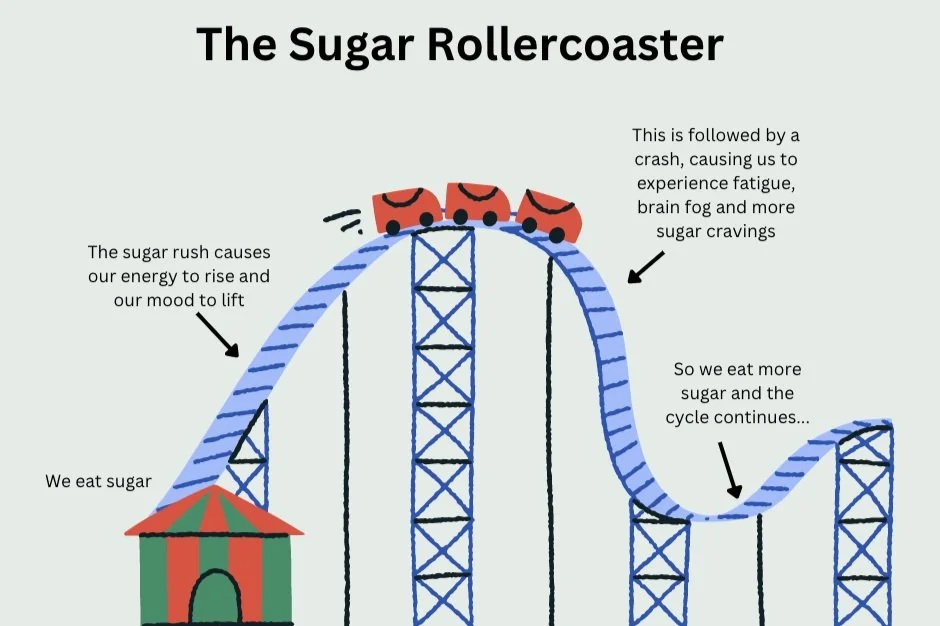Using diet and lifestyle to balance blood sugar and get off the sugar rollercoaster!
Do you often feel “hangry”? Do you crave carbs and sugar? Do you have belly fat or find it difficult to lose weight? Do you feel anxious and moody for no apparent reason?
These are all signs that your blood sugar may be imbalanced.
Blood sugar influences many areas of our functioning, including the immune system, hormones, the nervous system and inflammation.
Dysregulated blood glucose is associated with many health conditions including:
- anxiety and depression
- mood changes and hyperactivity
- sleep problems
- fatigue and difficulty concentrating
- weight gain and obesity
- candida and chronic infections
Unfortunately, many people do not have balanced blood glucose and are stuck on a sugar rollercoaster, experiencing blood glucose spikes and crashes and the resulting symptoms of fatigue, brain fog and cravings for more sugar...
Over time, blood sugar imbalance can lead to more serious conditions, including:
- insulin resistance (when your cells no longer respond to insulin and lose their ability to detect and store glucose)
- Polycystic Ovary Syndrome (PCOS) (associated with insulin resistance)
- hormonal imbalance, particularly excess adrenalin and cortisol (stress hormones)
- immune dysfunction
Here are some tips to help you and your family get off - and stay off - the sugar rollercoaster!
Ensure your meals are balanced – each meal should contain protein, healthy carbohydrates and good fats. Eating a balanced breakfast is particularly important as this will help to stabilise blood sugar for the day
Choose low glycemic index (GI) carbohydrates, e.g. leafy greens, broccoli, cauliflower, cabbage, sweet potatoes, carrots, apples, pears, berries, brown rice, oats, nuts, seeds, legumes
Avoid sugary, refined high GI carbohydrates, e.g. soft drink, whiteflour (including bread, cakes, biscuits), refined sugar, fruit juice
Increase intake of fibre, e.g. fruit, vegetables, whole grains, nuts, seeds
Include sources of resistant starch in your diet, e.g. cooked and cooled potatoes and beans, green banana starch
Make sure you eat enough protein to stabilise blood glucose and control hunger
Use natural sweeteners in baking, e.g. coconut sugar, maple syrup, dates, stevia, xylitol, honey, rapadura sugar (these are all lower on the glycemic index than refined sugar)
Include chromium-rich foods in the diet (chromium helps insulin bind to insulin receptors and assists with getting glucose from the blood into the cells). Sources of chromium include broccoli, nuts, egg yolk, green beans, brown rice, beef, whole grains
Increase intake of magnesium-rich foods and supplement if necessary (magnesium is required for the secretion of insulin and low magnesium has been associated with reduced insulin sensitivity). Sources of magnesium include leafy green vegetables, wholegrains, beans, oats, apricots, tofu, brown rice, salmon, avocado, nuts and seeds
Manage stress – the stress hormones adrenalin and cortisol cause blood sugar to rise.
Exercise daily - exercise increases insulin sensitivity and reduces cortisol
Avoid soft drink, including diet or zero-sugar drinks.
Many people think diet soft drinks are a healthier option, particularly if trying to reduce sugar intake, but unfortunately the artificial sweeteners in diet or zero-sugar drinks trick your metabolism into thinking that sugar is on its way and this causes your body to pump out insulin. Regular AND diet soft drinks are associated with an increased risk of diabetes so should be avoided, especially by people with blood sugar imbalance.
For more info see my blog post - https://www.nourishtothrive.co...
If you feel that your blood sugar may be a bit out of whack or you have been advised by your doctor that you are prediabetic or insulin resistant, get in touch to book a consultation :)
References
Dietz L, 2022, ‘Blood sugar imbalance: 11 signs your body is crying for help’, All the nourishing things, viewed 2
January 2023, https://allthenourishingthings...
Gladish S, 2019, The 30-Day Hormone Solution, Page Street Publishing, USA.
Hyman M, 2016, The Blood Sugar Solution: 10-Day Detox Diet, Yellow Kite Books, USA.
McElvey B, 2022, ‘Blood sugar imbalance: signs and causes of imbalances’, Nutrisense, viewed 2 January 2023, https://www.nutrisense.io/blog...
Sherman J, 2016, Raising Resilience, IC Publishing, Canada.


